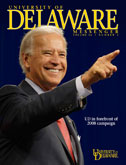
The University has opened a new, interdisciplinary Center for Public Horticulture, created to address such needs as training for current professionals in the field, research on issues in public horticulture, leadership, unity and collaboration.
Public horticulture is the art and science of cultivating plants in spaces for public use and enrichment, including public gardens, conservatories, arboretums, municipal parks and gardens, cemeteries, museums with public landscapes, nature centers and zoological parks.

The center builds on UD’s rich history of public horticulture education and research. The University has been a leader in public horticulture through the Longwood Graduate Program, established in 1967, and through the UD Botanic Gardens, which began in the late 1950s with the planting of specimen trees and shrubs around Townsend Hall.
The new center, developed during four years of planning, was created with input from more than 75 leaders in public horticulture from across the country through interviews, focus groups, surveys and informal discussions. It was announced at a ceremony on campus in June.
“By formally establishing this center, we reaffirm our commitment to preserving and optimizing managed landscapes for the public good through practice, example and education,” UD President Patrick Harker said at the time.

The center aspires to be a national leader in formal and professional education and research in the field of public horticulture and an unbiased source of information for professionals, students and decision makers. It will produce public horticulture professionals through innovative education programs for students of all ages and career stages and conduct, organize and disseminate valuable research and information resources. In addition, partnerships will be established among academic institutions, public gardens and professional organizations.
Robert Lyons, director of the Longwood Graduate Program in Public Horticulture, also is directing the new center.
“Establishing the Center for Public Horticulture echoes that commitment to education and extends it to include new research findings that will strengthen the value of public horticulture and increase its awareness nationwide,” Lyons says. “The center’s efforts will be grounded in partnerships and collaborations with other organizations, large and small, in ways that augment the future aspirations of the University of Delaware and improve the quality of life of all citizens.”
Students in the Longwood Graduate Program, who earn a master’s degree in public horticulture, benefit from a combination of UD’s academic offerings and the hands-on knowledge they gain at nearby Longwood Gardens, which serves as one of the laboratories for their experiential learning. Many graduates have gone on to upper management and directorial positions at some of the best public gardens and arboretums in the country. One such graduate, Ed Moydell, AG ’06M, spearheaded the feasibility study of the center through his master’s degree thesis research while a student in the Longwood Program; he now serves as the center’s associate director.
The center will work closely with the American Public Gardens Association, the national representative organization for public gardens, and the American Society for Horticultural Science. Both organizations have helped shape the mission of the new center and offered philosophical support, information and opportunities for collaboration.
At the opening ceremony for the center, Paul Redman, director of Longwood Gardens, called the venture “very exciting.” The field of public horticulture is relatively young, he noted, saying the center “will provide those of us in the field the resources and the tools to grow professionally.”
The Center for Public Horticulture was made possible through the support of Emalea Warner Trentman, a friend of UD and granddaughter of Emalea Pusey Warner, after whom Warner Hall on the campus is named. Trentman made a gift to fund the Emalea Warner Trentman Scholarship and the Emalea Warner Trentman Public Horticulture Endowment.
“We are very grateful for the generous support we have received from Emalea Warner Trentman, which has made it possible for us to establish the center,” says Robin Morgan, dean of the College of Agriculture and Natural Resources. “Through such support and extensive collaboration with partner organizations, UD can draw from its rich experience in this field to make a difference in our communities.”
Visit www.publichorticulture.udel.edu for more information.





